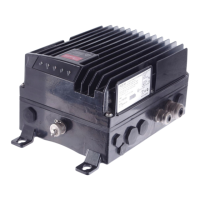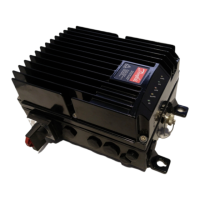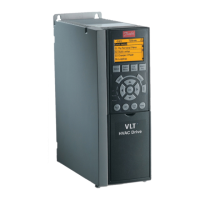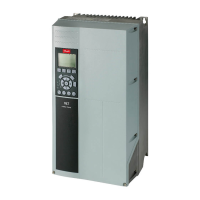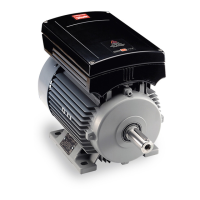VLT
®
FCD Series
■ Special conditions
■ Galvanic isolation (PELV)
PELV (Protective Extra Low Voltage) isolation is
achieved by inserting galvanic isolators between the
control circuits and circuits that are connected to the
mains potential. These separators are designed to
meet the requirements for increased separation by
means of having the necessary creepage and air
clearance. These requirements are described in
standard EN 50 178. It is also a requirement that in-
stallation is carried out as described in local/national
PELV regulations.
All control terminals, terminals for serial communica-
tion and relay terminals are safely separated from
the mains potential, i.e. they comply with the PELV
requirements. Circuits that are connected to control
terminals 12, 18, 19, 20, 27, 29, 33, 42, 46, 50, 53,
55 and 60 are galvanically connected to one another.
If switch S100 is opened the potentials of the group
18, 19, 20, 27, 29, 33 are separated from all other
input/output. In that case terminal 12 cannot be used
for supply for the digital inputs on these terminals.
Serial communication connected to terminals 67 - 70
is galvanically isolated from the control terminals, al-
though this is only a functional isolation.
The relay contacts on terminals 1 - 3 are isolated
from the other control circuits with increased isola-
tion, i.e. PELV is observed for these, even though
there is mains potential in the relay terminals.
The circuit elements described below form the safe
electric separation. They fulfill the requirements for
increased isolation and associated testing pursuant
to EN 50 178.
1. Transformer and optical separation in voltage
supply.
2. Optical isolation between Basic Motor Control
and control card
3. Isolation between the control card and the power
part.
4. Relay contacts and terminals relating to other cir-
cuits on the control card.
PELV isolation of the control card is guaranteed un-
der the following conditions:
- TT network with maximum 300 Vrms between
phase and earth.
- TN network with maximum 300 Vrms between
phase and earth.
- IT network with maximum 400 Vrms between
phase and earth.
A motor thermistor connected to terminals 31a-31b
must be double isolated to obtain PELV. Danfoss
Bauer provides double isolated thermistors.
See also the section Diagram in the Design Guide.
■ Earth leakage current and RCD relays
Earth leakage current is primarily caused by the ca-
pacitance between motor phases and motor cable
screen. When an RFI filter is used, this contributes
additional leakage current, as the filter circuit is con-
nected to earth through capacitors.
The size of the earth leakage current depends on
the following factors, in order of priority:
1. Length of the motor cable
2. Motor cable with/without screen
3. High switching frequency
4. RFI filter used or not
5. Motor earthed on site or not
The leakage current is of importance to safety during
handling/operation of the frequency converter if (by
mistake) the frequency converter has not been
earthed.
NB!:
Since the leakage current is > 3.5 mA, rein-
forced earthing must be established, as this is
required to ensure compliance with EN 50178.
Never use ELCB relays (type A) that are not suitable
for DC fault currents from 3-phase rectifier loads.
If ELCB relays are used, they must be:
- Suitable for protecting equipment with a DC con-
tent in the faulty current (3-phase bridge rectifier)
- Suitable for a pulse-shaped, brief discharge on
power-up
- Suitable for a high leakage current (300 mA)
■ Extreme operating conditions
Short circuit
The frequency converter is protected against short
circuits on motor terminals U, V, W (96, 97, 98). A
short circuit between two motor terminals would lead
to an overcurrent in the IGBT module, which means
that all transistors in the IGBT module would inde-
pendently cut out.
The the inverter turns off after 5-10
s and the fre-
quency converter displays a fault code, although this
depends on impedance and motor frequency.
MG.04.A1.02 - VLT is a registered Danfoss trade mark
118
